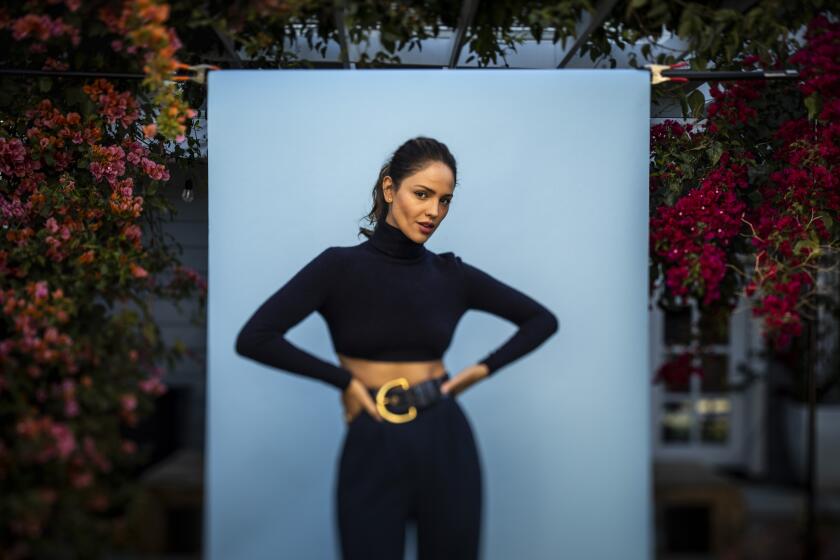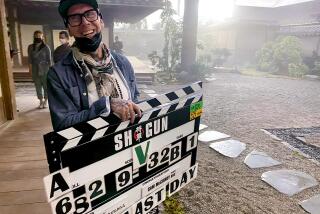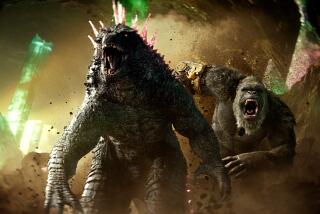How the ‘Godzilla vs. Kong’ team approached those spectacular kaiju fights
This story contains spoilers for “Godzilla vs. Kong.”
“Godzilla vs. Kong” director Adam Wingard knows that the film’s audience is really only interested in one thing — spectacular fights between the two titular monsters.
He was happy to deliver.
“People are coming to see the destruction and the madness and the spectacle, so you’re never trying to get away from that,” said Wingard during a recent video call. “But a monster you care about [makes it] even more interesting when it’s destroying things.”
The latest entry in Warner Bros. and Legendary Pictures’ Monsterverse franchise, “Godzilla vs. Kong” follows the events of 2019’s “Godzilla: King of the Monsters” and 2017’s “Kong: Skull Island.” In the film, out now in theaters and on HBO Max, humans are continuing to research the kaiju — or Titans, in the film’s parlance — that inhabit the world.
Kong is being held and monitored within a giant dome in order to be kept off of Godzilla’s radar. Godzilla, meanwhile, has recently started attacking specific research facilities seemingly unprovoked, and government scientists can’t figured out why. Eventually, the humans formulate a plan that involves moving Kong out of his protective bubble to serve as a guide on a trip to the center of the Earth.
But Godzilla is a creature of instinct so he quickly senses Kong and chases after him. Their battle is inevitable.
Despite featuring a cast that Wingard describes as “some of the best actors alive” — including Rebecca Hall, Alexander Skarsgård, Millie Bobby Brown and Brian Tyree Henry — “at the end of the day, the humans are there to support the monsters.” He points to the “Godzilla vs. Kong” promotional material as proof of who the real stars are.
Eiza González became famous at 15 as the star of own TV series in Mexico. Hollywood hasn’t been as easy, even after her “Baby Driver” breakthrough. But her fight to bust stereotypes is paying off.
“For me, it was always about making you invested in the monster story,” said Wingard.
His goal was to make sure Godzilla and Kong were treated with respect and presented as fully realized characters with consistent points of view. He also wanted to make sure audiences would empathize with them, particularly Kong.
“My experience with these monsters growing up was always one where I was really projecting my own ideas on what they were experiencing and thinking,” said Wingard, who watched all previous “Godzilla” and “King Kong” films chronologically to prepare for this film. “I wanted to really make sure that the character of Godzilla and the character of King Kong are treated as such and not just monsters [or] props that are running amok and blowing things up, even though that’s part of it too because that’s half the fun.”
Part of delivering on this fun are the two main showdowns involving Godzilla and Kong. The first of these is a battle on the ocean, which was basically Wingard and his team’s starting point for the visual effects.
“We always knew the ocean battle was the safest place to start, because it never changed in any draft of the script,” explained Wingard. “When you’re getting into animation, you’re trying to place most of your bets [on something] you think is going to be the sequence that’s actually going to make the final cut of the movie.”
This first battle takes place as Kong is transported on a carrier ship across the ocean. Sensing a fellow “alpha Titan,” Godzilla catches up to the convoy and initiates the fight.
Godzilla! Kong! Fight! The kaiju showdown restores some of the giddy escapism that’s been missing from the big screen lately.
As the first big visual effects-heavy sequence theteam worked on, Wingard said, they “went through the whole process the way you’re supposed to.” Meaning using storyboards, animatics and previsualizations to plan out the scene before going into postvisualization and making the shots for real.
“I had all these different things to play with,” said Wingard. “They’re on the ocean, [so] Kong’s out of his element. Godzilla’s in his element, Kong doesn’t want to fall in the water because he can’t swim as well. There was just this natural progression of the approach to that fight.”
Still, visual effects supervisor John “DJ” DesJardin explained that the ocean setting came with its own challenges, such as the open water and the monsters going underwater all while beating each other up.
“It’s like another level of complexity that you don’t necessarily get when you’re banging through a city,” said DesJardin.
Then, for the final big battle, Wingard and team stepped away from the traditional workflow. After a trip to Hollow Earth — a world inside the Earth populated by monsters — Kong intercepts Godzilla as he is wreaking havoc in Hong Kong. While Kong was obviously disadvantaged in their ocean battle, this time he is armed with an ax that appears to have been used by his ancestors to fight Godzilla.
“One of the most provocative things in the script was the mention that when Kong goes into Hollow Earth, he finds a giant scepter,” said Wingard. “So I started thinking about that. … Even if we’re not going to reveal [it] necessarily in the film … I needed to have my own backstory.”
Wingard saw it as an opportunity to give Kong a weapon that would allow him a fighting chance against Godzilla since, objectively, it’s hard to believe the two are equally matched.
“I just started thinking about what could this be and what kind of weapon would actually work against Godzilla,” said Wingard. “Anything I thought of just didn’t make any sense because Godzilla’s skin just has this feeling of being totally impenetrable. And it was only when I started realizing, ‘Well, I think the only thing that would cut Godzilla would be Godzilla himself,’ that the light bulb went off.”
This inspired the creation of Kong’s ax, which looks like it is made from a piece of Godzilla’s spine. Its existence is not only useful but hints at an ancient history between the two monsters.
But the new weapon is not the only thing that boosts Kong’s chances in the rematch. The setting also helps.
“When you have King Kong as a character, what’s great about him is that he’s anthropomorphized and he’s got opposable thumbs and he can think more in an intelligent way and he can kind of problem solve,” said Wingard. “So when you’re approaching a fight scene with him, you’re trying to always think about the terrain and how he would utilize it.”
So to give Kong an additional leg up, Wingard had Hong Kong’s skyline slightly tweaked — the buildings were made to appear taller than they actually are.
“Even though Kong was at a disadvantage, because he’s not one-on-one as powerful as Godzilla, his advantage was being able to utilize his environment,” said Wingard.
But things get even more complicated when Mechagodzilla joins the fight.
“He’s a jerk,” said DesJardin. “He fights dirty. There are some moments that Adam had us do with that that made us laugh the most because we’re just like, ‘Ah, yeah, you’re really not gonna like him very much.’”
DesJardin also explained that while working on this battle, they departed completely from the routine workflow, which allowed Wingard to explore various ideas.
“Instead of doing this extensive previs-postvis version, we would just go to [visual effects companies] Scanline or Weta or whoever’s dealing with that part of the movie and say, ‘Let’s pretend this is a real shoot,’” said DesJardin. “‘We’ve already got these characters. Let’s animate them doing these things that Adam wants to do. And then let’s put like six or seven cameras on him that we think might be interesting.’”
Wingard would then take all of the different footage and put together an edit with the film’s editor, Josh Schaeffer. It was a workflow that was only possible because they were later in production, with good versions of the monsters and set pieces already built.
“I feel like we had a really tight feedback loop to craft those sequences and make them as bombastic as they are because of that workflow,” said DesJardin.
More to Read
Only good movies
Get the Indie Focus newsletter, Mark Olsen's weekly guide to the world of cinema.
You may occasionally receive promotional content from the Los Angeles Times.












